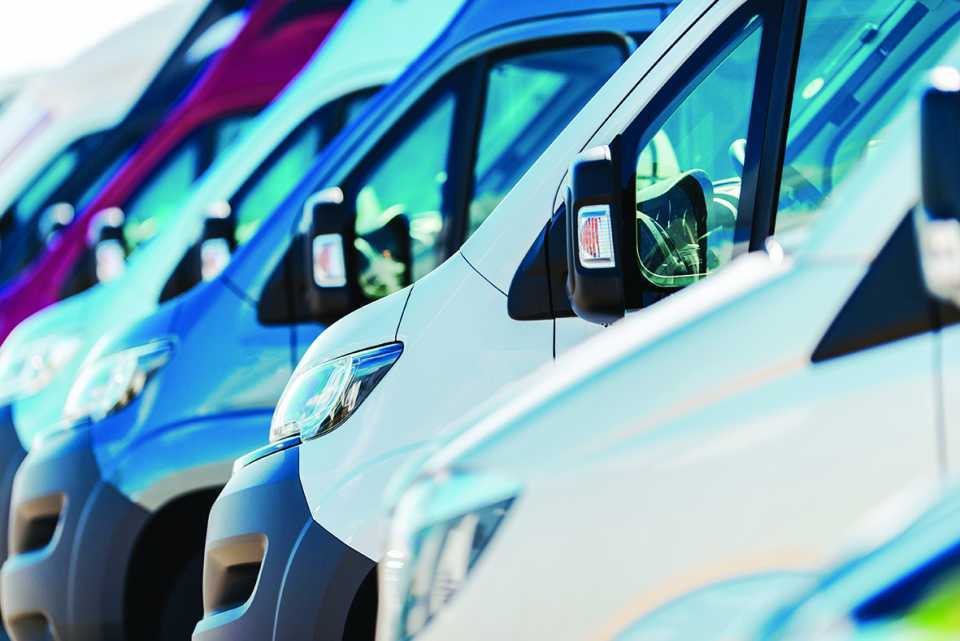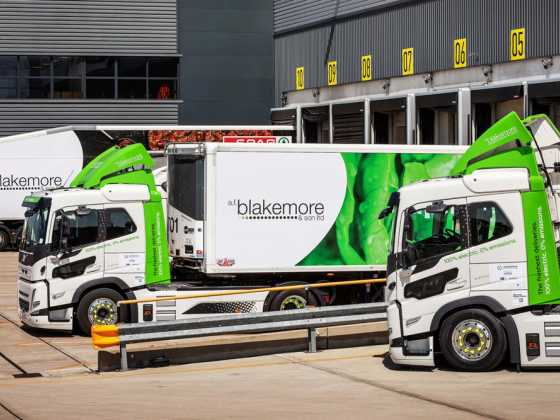Panel of Experts: SME fleet operations

With many SMEs negatively impacted by the Covid-19 pandemic, any efficiencies that can be gained from fleet operations are welcome. Our expert panelists Lee Brown, Marc Samuel and Toby Poston share their advice on streamlining fleet management, improving SMR practices, and reducing emissions
Panellist biographies below
Many small businesses have taken a big hit from the Covid-19 pandemic. According to the Federation of Small Businesses, one in ten small firms have already been forced to make redundancies, despite the government’s furlough scheme. Cash flow is important for SMEs, but many are being crippled by late payments thanks to the pandemic, with 62 per cent having been subject to late or frozen payments since March.
It is crucial that SMEs run as efficiently as possible to keep costs down, now more than ever. For those SMEs that operate a fleet or vehicles, our expert panelists share some thoughts on how to streamline SME fleet operations.
Lee Brown, head of 0Zone at Grosvenor Group suggests that now is a good time to assess the mobility requirements of the business. “Map out why travel is needed, where it is needed, when it is needed and who needs to travel,” advises Lee. “Then determine what vehicles you need to support this and how you source, fund and manage them.”
Because of the Covid-19 lockdown, Lee believes that there has been a monumental shift in attitude towards conference calls and online meetings. “This is likely to change the landscape of how we interact with customers, prospects, suppliers and remote members of staff forever,” says Lee.
“If the model for mobile working and use of vehicles is changing, now is a great time for SMEs to review their vehicle fleets as they look to the future.
“There are some quick fixes for small businesses in terms of driving down costs – for example, introducing more stringent maintenance controls, or seizing the opportunity to reduce fuel bills by discouraging unnecessary travel.
“However, significant long-term savings can be made by looking at new vehicle policies that encourage ultra-low emission and electric vehicles, salary sacrifice schemes, which have suddenly become very financially attractive due to the very low BIK on sub 50gsm/km CO2 vehicles, and looking at non-maintenance contract hire with a ‘managed’ pay on use maintenance service.”
“If you own a vehicle fleet, and are suffering from cash flow problems due to lockdown, a sale and leaseback can be a good option as this moves an owned fleet to contract hire with an immediate cash injection,” Lee adds.
Marc Samuel, head of SME & B2B telesales at the AA believes that small and medium sized companies should not be afraid to ask their suppliers - including leasing companies, insurers, and roadside assistance providers - for help and advice. He says: “It is in everyone’s interest to keep Britain’s businesses moving, and we would recommend UK SMEs make their voices heard when it comes to policy and decision-making.”
Marc also points out that now is a good time to cash in on any trials that are on offer, as the industry is looking to entice people into electric vehicles. He says: “Our advice for SMEs looking to make changes to their fleet, such as altering the vehicle mix or moving to full electric, is to engage early with the vehicle manufacturers and charging companies. There is a real desire to share knowledge and experience, so SMEs should be able to take advantage of vehicle trials and extensive consultancy support when deciding which route is best for them. It makes sense to do a vehicle and route analysis, to decide which vehicles are necessary.
“Ask as many questions as you need in order to feel comfortable with your decision-making, get financial buy-in from everyone involved, and make sure that drivers are part of the process as they will be instrumental to the successful transition. Training and engagement activities are key to electric vehicles living up to their potential, especially in an SME environment where organisations cannot afford to make costly mistakes.”
Making the switch
With the financial worries that the pandemic has caused, SMEs could be forgiven for delaying the purchase of alternatively fuelled vehicles because their upfront costs are high.
What would our panelists advise in this situation?
Toby Poston, director of corporate affairs at the British Vehicle Rental & Leasing Association (BVRLA) says that while the shift to electric vehicles can be daunting, the barriers to going green are rapidly disappearing, particularly for business fleets.
“The £3,000 Plug in Car Grant, the £350 workplace charging grant, the 0 per cent company car tax rate and the arrival of a new generation of more affordable, longer range electric cars and vans have all helped to make an increasingly attractive total cost of ownership proposition for fleets,” explains Toby. “There is a lot of advice and case studies out there, but a good place to start would be the Government’s Go Ultra Low website, which has a section dedicated to business and fleets and an excellent list of FAQs.”
Marc Samuel believes that education about the actual running of an electric vehicle fleet is needed. He says: “More awareness is required around the whole life costs (WLC) equation; helping fleet managers and business owners to make informed decisions about their investment in new technology over the total course of its working life, not just considering the upfront investment.
“Many of the same components require maintenance and repair, whether the vehicle is petrol, diesel or electric. Issues related to tyres, brakes and the 12V battery are consistent across all powertrains. Although SMR costs for EVs may not be enough of a saving in isolation to convince SMEs, the relative cost benefits are stacking up alongside other upsides, including emissions reduction, increased uptime, and fuel cost benefits.
“Workplace charging has the potential to be a revenue generator as well as an upfront cost, while electric vehicles offer various tax benefits, as well as future-proofing SMEs for the eventual roll out of more Clean Air Zones and Low Emission Zones.”
Lee Brown agrees that whole life costs must play a big part in any decision about electric vehicles. He says: “EVs are more expensive at the moment and you may need to invest in workplace charging.
“However, if you look at their overall running cost including ‘fuel’ (energy), depreciation, maintenance and taxation/employer’s NIC, they are often better value in the long run. Battery Electric Vehicles (BEV) attract zero class 1a National Insurance currently whereas the costs for equivalent combustion engine vehicles run into the thousands per vehicle each year.
“We are working with a wide range of customers at Grosvenor to develop ultra-low emission and electric vehicle policies based on whole life costs, and when you compare these ‘like for like’ with equivalent petrol and diesel models, the facts speak for themselves.”
Lee raises the fact that the UK government offers a workplace charging grant at £350 per socket which is available for up to 40 sockets. “Incentives like this won’t be around forever,” says Lee. “So now is the moment to start moving to EVs, especially as many drivers are travelling less distance due to heightened use of online conferencing which suddenly makes EVs more viable operationally as well as financially.
“It’s for this reason we have expanded our 0Zone solution at Grosvenor. This is our service to help companies make the smooth transition to ULEVs and EVs and we now offer a three-tiered approach that assesses the environmental, financial and operational impact of alternative fuels so that businesses can make a balanced decision.”
Service, maintenance and repair
Service, maintenance and repair (SMR) arguably takes up a lot of time for SMEs, as time is often used on other matters. But SMR needs full attention, for driver and vehicle safety, as well as to save money. So how can it be managed more effectively?
Marc Samules believes that it should start with the drivers: “Instilling good driving practices and ensuring drivers make regular visual checks of their vehicles will help highlight any issues as soon as they arise – and allow them to be addressed proactively, efficiently, and effectively.
“Similarly, making sure drivers bring their vehicles in for routine service is vital to identifying any potential issues and taking the necessary steps to repair or replace parts which may cause a problem – before the resolution becomes an expensive one or vehicles and their drivers are kept off road.
“Proactively putting in place support with an organisation such as AA Prestige, which has marked a 25 per cent increase in its audited independent network over the past 18 months, can ensure SMEs are ready to respond should any SMR issues arise. Real-time monitoring via the RealTrak dashboard can ensure SMR is managed upfront, while an initial investment in connected technologies and onboard diagnostics can pay dividends in spotting servicing and maintenance needs before they become an emergency.”
Toby Poston believes that while managing SMR can be complex and time-consuming, it is more essential now more than ever as cash-strapped businesses exit lockdown and have staff and vehicles returning to the roads after long-layoffs.
“There are lot of expert providers out there that can help you with your fleet management hassles, ranging from smartphone apps to a fully outsourced service,” advises Toby. “In many cases, the cost of this service can be more than covered by the savings and efficiencies that can be achieved. SMEs should also take a look at the new ‘Ready for the Road’ package offered by Driving for Better Business, which provides a free driver app and management portal.”
“Now that the MOT exemption is being lifted, SMEs are advised to book test slots as soon as possible for any vehicles that are due now or imminently. We are expecting a big surge in demand for MOTs in the Autumn months,” Toby adds.
Agreeing that SMEs should seek expert help in this area, Lee says: “My advice would be to treat maintenance like any other highly specialist area of business and find an expert to manage it for you.”
Researching other mobility options other than vehicle ownership could also help. Lee says: “If you own your vehicles consider moving to a pay on use, managed service from a fleet management specialist so that you can tap into the expertise of qualified technicians who will authorise all work on your behalf. They know what work is reasonable, what the costs should be, what labour time should be applied and will assess whether the work is necessary at all. Having them on your side will deliver immediate savings.
“Within Interactive Fleet Management, we are saving money day in, day out by managing our customers’ maintenance for them; all of which is available online to customers through OSCAR365 - our own fleet management system. In fact, our maintenance team treats ‘pay on use’ customers in exactly the same way that we treat our own budgeted maintenance vehicles – it’s all about cutting costs.
“The other option is to fix your costs under a contract hire agreement, which also removes the stress and precarious costs of servicing, maintenance, repair and fast fit items.”
Travel policies
The Covid-19 lockdown has made us think about travel differently. Virtual meet-ups have show they can work instead of face to face meetings, and the lack of air pollution has made us realise the extent travel impacts the planet. Now lockdown is easing, travel has not bounced back to normal. Government is asking people to avoid public transport due to potential virus spread, and embrace walking and cycling instead. But if that is not possible, the danger is that there is an increase in car use as people avoid mixing with others.
So as an employer, what staff transport policies should SMEs put in place?
“AA research suggests one in six UK drivers hung up their keys completely in April, while just one in 20 were driving as much as before the coronavirus lockdown. This led to improvements in air quality, as well as reductions in traffic and congestion,” says Marc Samuel. “As a result, in May, four fifths of people said they would take action to help maintain cleaner air after lockdown, suggesting opportunities for SMEs to consider how their people get around.”
Marc continues: “Walking and cycling more, coupled with less driving and more home-working, could have a significant effect on both reducing congestion and maintaining cleaner air – as well as supporting employees who are nervous about a quick return to the status quo. We may well need radical thinking in our metropolitan areas, with provision for ‘park and pedal’ at the outskirts of cities so drivers can park up and complete their journeys on two wheels or two feet. We have already seen e-scooter trials accelerated in certain urban areas.”
Lee Brown points out that every business is different, and how they use their vehicles and other forms of transport will vary. He says: “Policies are very personal, however what is important is that the guidance and direction needs to come from the top of organisations and be very clear. If the policy is either unpublished or vague, staff members won’t be sure whether they should be travelling to meetings or not, coming into the office or not, or using public transport. This ambiguity will cause some people to travel and others not to and that will result in problems.”
“Now is the time to make it very clear what criteria you want your employees to work to,” adds Lee. “For example, if you do not need to travel – do not. If you can work from home, do so. Do not use public transport unless it is avoidable and always comply with Government safety guidance.
“It is also important to communicate your policies to your customers, to prospects, suppliers and anyone else you would have typically visited, or expected to visit you, before lockdown.”
“Do not leave it up to a member of staff to decide whether they should or should not go and see a major customer. Communicate your directive from the top and explain clearly why you have made that decision,” Lee warns.
Toby Poston concludes: “Aside from the back-to-work vehicle health check mentioned earlier, SMEs will also need to make sure that their transport policy is Covid-proof. They will need to reassess the travel expectations they have of all staff, whether they are essential or non-essential drivers – reflecting any health issues or family circumstances. They will also need to adjust their policies to reflect the latest social distancing and sanitisation guidelines. Again, I would recommend the Driving for Better Business website as an excellent free resource.”
Panellist biographies
Lee Brown, head of 0Zone, The Grosvenor Group
Lee Brown is head of 0Zone, the Grosvenor Group’s innovative and market leading solution to help companies navigate their way smoothly towards ultra-low emission and electric vehicles. Lee is also finance director of Interactive Fleet Management, the Grosvenor Group’s specialist fleet management business, which means he brings a perfect balance between how fleets can drive down their emissions and the financial implications of policy setting. Lee joined the Grosvenor Group in 2001, became finance director of Interactive Fleet Management in 2012 and is well-known for his clear and inciteful advice for companies with car and light commercial vehicle fleets.
Toby Poston, director of corporate affairs, BVRLA
Toby Poston is Director of Corporate Affairs at the British Vehicle Rental & Leasing Association. He has worked within the sector for more than ten years and currently oversees the association’s communications, events, campaigning and research activities as well as fostering relationships with key industry stakeholders. Prior to joining the BVRLA, Toby was a business journalist for fifteen years, spending much of this time as a reporter and editor within the BBC Business and Economics Unit, working across TV, radio and online channels.
Marc Samuel, Head of SME & B2B Telesales, the AA
Marc Samuel has taken up the newly created Head of SME & B2B Telesales role at the AA. Ex-Pendragon B2B director and Honda fleet sales operations manager, Marc is putting his 20+ years’ experience in the fleet automotive sector to good use overseeing direct sales activity for the organisation’s rapidly expanding suite of SME products and services. This includes smart breakdown services, managed services, remote and virtual support, as well as EV implementation guidance.






